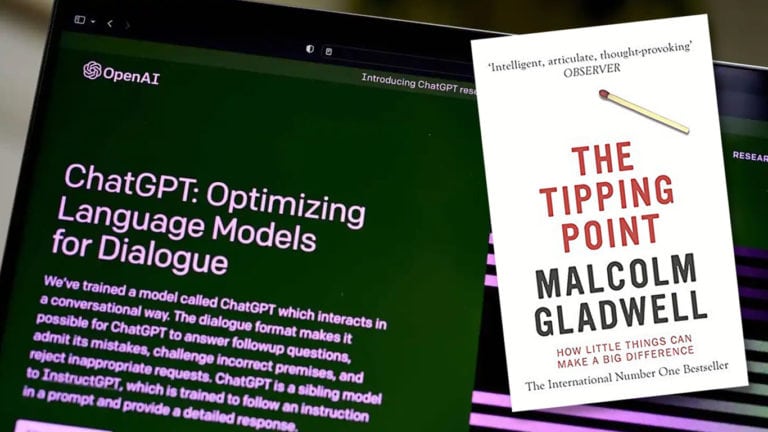Scattered Thoughts: How and why I started this blog.
Lately, I’ve begun to feel that inputting any tiny bit of new information into my head often triggers a cascade of thoughts, some directly relevant, some tangents, and at other times, completely unrelated ideas. In those often brief passing moments, sometimes only a minute or so, they are all potentially profound and monumentally meaningful. My mind is reaching out to grasp any single one of them, to turn it into something tangible and cohesive. It churns in my mind splitting off into other ideas like roots digging deeper into the ground, giving this entire concept some workable foundation. I can hear myself thinking, “I need to share this, I need to talk to someone about it, I need to ask others what they think… I need to remember this.”
Then the garage door opens. I drive my car in and park. Connect my charging cable. Close the garage. Think about what I should cook for dinner. Play with Souma, our family corgi. Turn on my computer. Launch League of Legends or whatever other game I’m playing at the time. Soon enough, that previous thought that I was struggling to capture is once again lost and forgotten.
Having an outlet for my thoughts and ideas before I forget them is one of the main reasons I started this blog, as a place to remember and share things before I forget them. The second reason is to have an opportunity to share my experience with others so that, hopefully, it can be helpful to those who need it.
To Niche or Not?
So, before I began, I did some preliminary study on how to create a great blog, and one issue that came up on occasion was how to narrow down the focus of your site into a specific niche. This makes a lot of sense if your goal is to dominate Google search results for a specific set of phrases, increasing traffic and, thus, your chances of making money.
Yet, this could be a two-edged sword. I may make a firm commitment to write on a single topic, such as branding or marketing; however, I may rapidly feel bored or frustrated since I only occasionally have something to write about on that specific topic, and if I can’t come up with content, I will fall behind in my cadence. If I make it a consistent habit, I’ll remember it.
I’m not sure what I want to write about right now. This site may become recognized for something special and niche in the future, but I’ll leave it open and unrestricted for now. I’ll write about everything and everything at first because it’s the simplest way to get started. Who knows, what I set out to accomplish might turn out to be something utterly unexpected or a happy accident.
“When I woke up just after dawn on September 28, 1928, I certainly didn’t plan to revolutionize all medicine by discovering the world’s first antibiotic, or bacteria killer. But I suppose that was exactly what I did.”
-Alexander Fleming
If the trick is to continue doing it and making an effort in it, this may be the only way to guarantee that I’ll always have something to talk about. After all, it does become nothing the moment you stop.
“I’m convinced that about half of what separates the successful entrepreneurs from the non-successful ones is pure perseverance.”
-Steve Jobs
I’m currently only writing for myself. This is my personal “thought” time capsule—a method for me to store a specific image of my life that captures who I am right now and how I think about things. Valued items will inevitably increase naturally and independently.
Will anyone care about what I have to say?
I’ve thought about this and I hope that eventually others will be interested in it. But I’ve come to understand that everything I do only matters when it matters, and you’ll be able to tell when it matters. What I mean is that when I was younger when I launched a new endeavor, such as a business or project, I always thought that everyone was aware of it and cared. As a result, I toiled to make everything flawless, preparing for a million viewers when there was initially just me as the audience. I would be critical of my own work and establish rules that I rigidly adhered to. I eventually came to the conclusion that I was judging myself based on an assumption of what the audience thought before an audience even existed.
“Progress comes from monopoly, not competition.”
-Peter Thiel’s -“Zero to One“
It seems harsh, but Thiel seems to be saying that real innovation and advancement come from creating something new and unique rather than simply competing with existing companies in the market. Thiel argues that successful companies can create a monopoly, or a unique position in the market, that sets them apart from their competitors.
He makes the argument that there is a fundamental difference between being at “one” in the market, where you may produce something truly innovative and valuable, and being at “zero,” where you compete with others. To fully distinguish yourself, you must be ready to take calculated chances, look for novel solutions, and think beyond the box. A business can accomplish long-term success and leave a long-lasting impression on the market by doing this.
It applies here since you are the only person who cares about your blog or new business venture when you first start it. It is also unreasonable to believe that you are the only one in a million with this particular point of view. Chances are that many people share the same point of view as you, in fact, it’s a good sign if they do since they would likely make up your target audience. However, both they and you are only one of a million voices striving to be heard.
To be heard and have an impact, your voice needs to be read frequently by a large number of people. The only way to attract a large audience is to explore creativity and novel concepts, which entails writing both within and outside of your comfort zone. You need to use writing to experiment with several voices in this early stage, before what you write counts, in order to find the voice that matters to other people. From zero to one, your voice transforms from a whisper in the crowd to a loudspeaker that everyone can hear.
It’s ok to say that my opinion is just an educated guess.
If I write something down, it should always be supported by data, case studies, and examples. After ten years of writing, I still have trouble finishing my work because of the same philosophical approach. My belief that my claims and opinions should be treated as scientific investigations has mostly been ingrained in me since college. That persisted throughout my marketing career, even though I was no longer in charge of a company’s collective viewpoints. I was terrified of writing something untrue because any incorrect remark may have serious legal repercussions for businesses and all the dedicated people who work there.
Yet if I continue to live by this principle, I might never record anything. I therefore need to let go of my need for perfection for this to function. I need to start viewing this as a dynamic document that will constantly change and be updated to reflect my evolving viewpoints.
Closing Remarks
Creating a blog can serve two valuable purposes: to remember and share ideas before they are forgotten, and to narrow down the focus of the site to a specific niche. But perhaps one of the most important details are that perseverance is key to success, and that real innovation and advancement come from creating something new and unique.
It always starts this way, with great effort and good intentions. Now it’s only a matter of whether I can keep up with it. I want you to know that the best motivation for starting a blog is knowing that others find it useful in some way, so you can help me along this journey by letting me know what you think.







